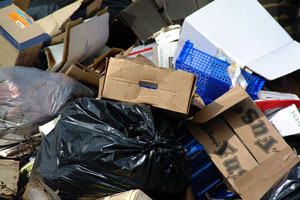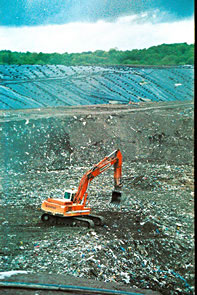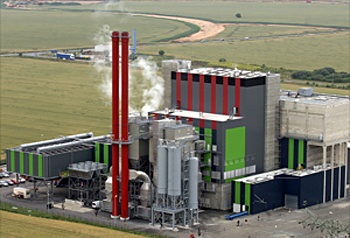European Parliament Adopts Strict Waste Reduction Law
Despite existing legislation, Europeans are producing more waste every year. Currently, in some member states, up to 90 percent of municipal waste goes to landfill sites. Europe-wide, only 33 percent of waste is recycled or composted.
The lawmakers are convinced this cannot go on. They want the upward curve to be halted in 2012 and waste production to start declining from 2020.
On a vote of 651 to 19 with 16 abstentions, Parliament today adopted a report by UK Conservative MEP Caroline Jackson on the framework directive.
The measure introduces targets for waste prevention and recycling, and directs all 27 EU member states to create national waste prevention programs within 18 months of the entry into force of the legislation, known as a framework directive.

The mountains of rubbish in Europe are growing, but MEPs voted to reverse the trend. (Photo courtesy FreeFoto)
The aim is to stabilize waste production at the level reached in 2008 by 2012.
But stabilizing production of waste was not enough for the MEPs. In addition, they set waste reduction targets to be reached by 2020 that would have to be established by 2010.
MEPs also adopted a report by Dutch MEP Johannes Blokland, of the Independence and Democracy group, on the “thematic strategy” for waste, a more general text without binding rules, whose content they intend to flesh out and make more ambitious. The vote on this report was 662 to 17, with three abstentions.
As result of these votes, the principle of a “hierarchy” in the treatment of waste is for the first time laid down in a piece of draft legislation as well as in the “thematic strategy.”
To prevent and reduce waste production, the hierarchy lays down an order of preference for waste operations - first prevention, then re-use, recycling, other recovery operations and, as a last resort, safe and environmentally sound disposal.
Opinions differed among MEPs as to how binding this hierarchy should be. In the end it was agreed that deviations from the order of priorities should only be allowed on the basis of established, publicly available scientific criteria.

The Pen-Y-Bont landfill site in Wales is one of the deepest in Europe and is expected to be full within 10 years of opening. (Photo courtesy WEN)
For MEPs a crucial point is to reduce the amount of landfill and incineration, both of which cause pollution.
But in the debate ahead of the vote, MEPs were divided over whether incineration should be regarded as a form of disposal or a recovery operation.
The Commission initially proposed that it should be categorized as recovery, provided it meets a certain energy efficiency standard.
MEPs backed the energy efficiency principle by laying down a scale of standards to be met by incinerators.
But in the end, a majority of MEPs rejected the idea that incineration should be regarded as recovery.
If this option remains in the legislation at the end of the co-decision procedure, the critics said, those involved in waste processing will no longer be able to opt as easily as they can today for the simple solution of incineration.
Parliament also introduced binding targets for re-use and recycling.
By 2020, 50 percent of municipal solid waste and 70 percent of waste from construction, demolition, industry and manufacturing must be re-used or recycled.
In principle any waste must, wherever possible, at least be recovered. Rules on landfill are also tightened up.
The “thematic strategy” now contains a schedule. By 2015, landfill will be banned for at least paper, glass, textiles, plastic and metal. By that date separate waste collection systems for these categories must be set up.
By 2020, no recyclable waste must end up in landfill sites.
Friends of the Earth Europe and the European Environmental Bureau, EEB, representing 143 member organizations in 31 countries, welcomed today’s vote backing waste prevention and recycling as the key elements for dealing with waste in Europe.
Dr. Michael Warhurst, waste and resources campaigner for Friends of the Earth Europe, said, “MEPs have supported European targets for recycling and waste prevention, which will help Europe’s economy become more resource efficient, and reduce our impacts on climate change.
“Their support for clear legislation supporting prevention, reuse and recycling, and their insistence on a biowaste directive, will make a real difference in creating a sustainable Europe,” said Warhurst. “Now national governments must also support these important measures.”

This waste-to-energy power plant in Zorbau municipality, Saxonia-Anhalt, Germany, can burn 300,000 tons of municipal solid waste per year. (Photo courtesy SITA Deutschland)
The environmental groups also congratulated MEPs for rejecting a misguided proposal to “re-brand” incineration, which would have promoted transporting and burning waste.
Doreen Fedrigo, EEB’s waste policy officer said, “Parliament has today added its voice to those of many EU countries by rejecting the Commission’s proposal to reclassify incinerators as ‘recovery’ facilities.”
“This would have encouraged countries with strict, costly facilities, like Germany, to export waste to cheaper ones, such as the newer member states which might have become the ‘burning grounds’ of Europe,” Fedrigo said. “The Commission now needs to rethink its approach.”
The MEPs added many provisions or principles which are more binding than those contained in the Commission’s initial proposal:
- introduction of a “polluter-pays principle”
- introduction of a “proximity principle,” i.e. that waste for disposal should be processed in one of the “nearest appropriate installations,” regardless of national frontiers
- a new article on traceability and control of hazardous waste
- a ban on mixing different categories of hazardous waste; hazardous compounds should be separated from all waste streams before they enter the recovery chain
- a call for legislation to be proposed to define which secondary products are no longer deemed to be waste
- new articles on biowaste and catering waste
- new articles on permits, especially for hazardous waste, and on sanctions
- creation of a Consultation Forum on Waste Management
The goals that Parliament has laid down with this first reading vote, together with the differing views, for example over incineration, herald a tricky co-decision procedure with the Council.
Now, following the Parliament’s first reading vote, on June 28, Environment Ministers will agree the Council Common Position.
In late 2007 or the first half of 2008, any disagreements between the European Parliament and the EU member states will be resolved in a second reading, involving further votes in Parliament. There may even be a further compromise process after these votes in order to get agreement.
In mid-late 2008, the new directive will be finalized once the European Parliament and EU member states agree. It will then be translated into national law in all 27 EU member states.
You can return to the main Market News page, or press the Back button on your browser.

